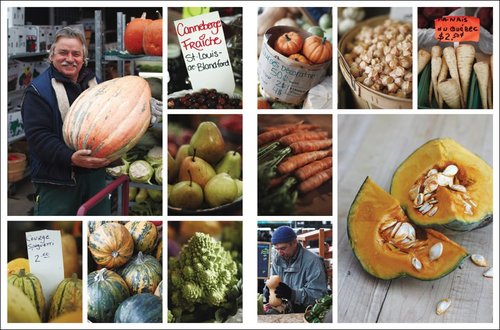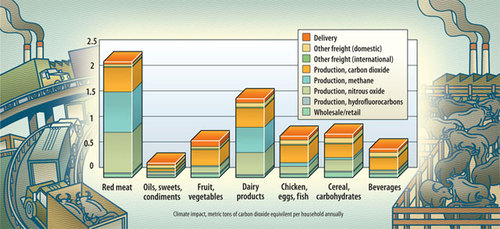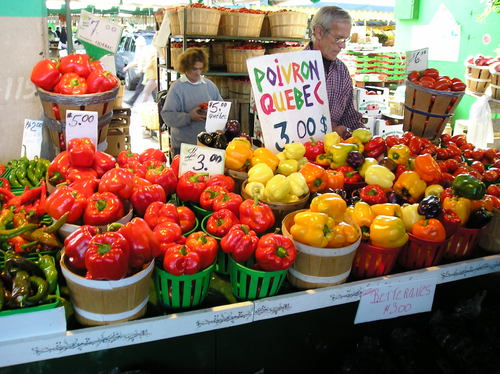
A locavore is an individual who is concerned with eating food that is grown within proximity to their region over imported food.
Even with local farming becoming increasingly available, affordable and accessible, the percentage of imported products continues to rise. Locavores support local farming and local eating in order to stay as closely connected to their food resources as possible, with the goal of easing economic, environmental and health issues.

What a Locavore Eats
Locavores often define local as food that is grown within 100 miles of where they live. Food that is grown and sold in ones region is a locavores main interest. When it is difficult to buy local because of proximity to resources, locavores often extend that number to 250 miles, as it may be challenging to locate products such as, meat, poultry and fish. Though often confused, locavores do not restrict their diet to organic food. The main criterion of a locavore rests on consuming food that is locally grown, so as to be as close to the source as possible.
Exceptions
When certain products are unavailable to a locavores region, exceptions can become necessary. Coffee, tea, chocolate and spices are among the main products that may be difficult to locate and would require a locavore to seek external resources. Although difficult for those in remote regions, locavores living in a metropolis may be able to find a local producer for these items in specialty stores. Research is key to a locavore who is becoming familiar with local sources that can provide them with products.
Why Locavores Choose to Eat Locally Grown Food
The main concerns for choosing to eat locally grown food have to do with conserving the environment, easing economical situations and benefiting from a healthier lifestyle. Below is a breakdown of these issues:
Environmental - Locavores believe that locally grown food keeps the environment clean while also sustaining a region with a functioning food system. The fewer products that are being packaged and transported from one locale to another, the less damage is being had on the environment. Urban gardening is also practiced among locavores in order to reduce heat-island effect within a metropolis. Locavores place importance on local planting to save on pollution, fuel, greenhouse gas emissions and climate changes. The image below distinguishes the environmental impact between imported and locally transported food in Canada for 2011.

*Climate impact, metric tons of carbon dioxide equivalent per household annually.
Economic - Locavores support local farmers and small food businesses within their communities. Locavores want to see money stay within their community rather than to a major corporation. When local food is purchased, particularly markets where your vendor is usually the same person who grew your food, money paid goes directly back to that farm/food source. The reason for this practice allows local resources to flourish and helps to sustain that regions economy. Food imports cost a great deal of money to package and transport. Food imports often outweigh how much local food is exported out, which deteriorates the economy.
 Health - Locavores tend to steer clear of imported foods, particularly produce, since they harbor toxins, waxes and sprays in order to survive the transportation process. Food less traveled equal's food that has the least chance of contamination. Local fresh food is also richer in nutrients since it has spent so little time away from its original source. Locavores have closer connections to their food systems which allow them to have further knowledge about who has grown their food, when, where and how their food was grown, and how to handle their food once it is bought and taken home.
Health - Locavores tend to steer clear of imported foods, particularly produce, since they harbor toxins, waxes and sprays in order to survive the transportation process. Food less traveled equal's food that has the least chance of contamination. Local fresh food is also richer in nutrients since it has spent so little time away from its original source. Locavores have closer connections to their food systems which allow them to have further knowledge about who has grown their food, when, where and how their food was grown, and how to handle their food once it is bought and taken home.
Where Locavores Get Local Food
Locavores support local farming. As a locavore, attaining local produce is an outstanding concern. It has become increasingly available to find local produce. Here are a number of resources that would allow a budding locavore to find the proper resources in order to eat local:
- Farmer's Markets - This resource is important to a locavores diet. These fresh produce/product markets are a staple location for a locavore. The Farmer's Market community is dedicated to planting and selling locally.
- CSA (Community Supported Agriculture) - Joining a neighborhood-run food basket can be an inexpensive way to eat local while also staying connected to ones community. CSA's purchase local products in bulk in order to keep costs low.
- Kitchen collectives - This method allows like-minded individuals to come together and purchase and prepare meals as a collective. This is an affordable and social way for locavores to attain the food they require.
- Local specialty grocers/butchers - Researching specialty shops in your area can lead a locavore to discovering a food culture within their city that shares their values. These resources also tend to carry the "exception" items listed above.
- Community gardens - Urban agriculture has become a relevant method for locavores to obtain local food. Urban plots are used to grow fresh produce, making it easy for a locavore to sustain their own local dietary needs.
- Planting/growing/raising your own food - Raising your own animals or planting your own produce is a definitive way to become involved in local eating.
How Locavores Sustain Their Food Needs All Year
The fresh food ethic among locavores is based around seasonal eating. The seasons speak for what produce is planted and consumed. When certain items become available, locavores rely on preservation in order to continue consuming particular products. Between freezing, canning and curing, a variety of seasonal fruits, vegetables and meats can be preserved for year long consumption.
Locavores also practice planting their own pots when seasonal climate conditions make it difficult to find local items such as herbs, lemons and limes.
Images courtesy of: Toms Culinary Ride, Kojo Report, Glendale Heights, Marche Jean Talon Portraits.
Leave a comment